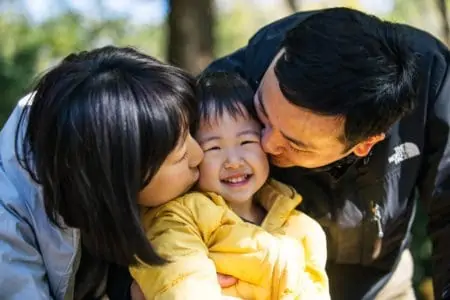Few ancient cultures are as magical as the Mayan civilization. Known for astronomy and an early calendar system, the Mayans also have powerful names. How do you best dive into the complicated world of Mayan names for the baby boy or girl you’re expecting?
All you need to know about Mayan baby names can be found here on our list. You’ll discover their origins, meanings, and sometimes tricky pronunciations. Along the way, you’ll also learn about the leaders, myths, and cultural traditions that continue to fascinate us today.
100 Popular Mayan Baby Names
Choose from the best Mayan names to bring some enchantment to your little one’s life.
Aapo
Like Abraham, Aapo means “father of many nations” in the Mayan culture. It’s also a Finnish and Estonian version of Abraham that’s mostly used for boys now.
- Origin: Mayan, Finnish
- Meaning: Father of many nations
- Pronunciation: EHAH-Pow
- Namesakes: Aapo Inkinen, a member of the Parliament of Finland from 1939 to 1948. Aapo Mäenpää, a Finnish footballer for Ilves.
- Popularity: In 2023, Aapo ranked 119th for boys in Finland.
Abarrane
Among Mayan names, Abarrane is another female variation of the Hebrew Abraham. It’s also used in Basque culture and is perfect for little girls who want to stand out.
- Origin: Mayan, Basque
- Meaning: Mother/father of many
- Pronunciation: Aa-bae-REYN
- Variations: Abarane, Abarayne, Abarraine
- Popularity: Abarrane does not appear in the U.S. Social Security Administration list of names.
Abha
Abha means “brightness” in Mayan culture and similarly means “shining,” “lustrous,” and “luminous” in Sanskrit. It means “most glorious” in Arabic and symbolizes the “name of heaven” in the Bahá’í Faith. Abha is also the capital of the Asir province in Saudi Arabia.
- Origin: Mayan
- Meaning: Brightness
- Pronunciation: AHB-Haa
- Variations: Aabha
- Namesakes: Abha Dawesar, an Indian writer known for Babyji (2005).
- Popularity: Abha peaked in the U.S. in 1967, when it still didn’t rank in the top 4,000 girls’ names.
Abi
Abi is also another spelling for the English girl’s name, Abby, a short form of Abigail, meaning “father’s joy.” Abi was also the biblical mother of King Hezekiah and the daughter of Zachariah.
- Origin: Mayan, Hebrew
- Meaning: My father’s delight
- Pronunciation: AA-biy
- Variations: Abie
- Namesakes: Abi (born Abigail Hoffman), an American singer/songwriter known for the 2017 single Matches.
- Popularity: Abi is rare in the U.S. in 2021, with only 14 baby girls named Abi.
Abund
Abund refers to a “war chief,” but also means “living in abundance” in Mayan. Even among Mayan boy’s names, it’s considered rare today.
- Origin: Mayan
- Meaning: War chief
- Pronunciation: Aa-BUHND
- Popularity: Abund is rare worldwide and doesn’t appear on any popularity rankings.
Ahaw
Ahaw is one of the twenty days in the Maya calendar and also means “lord.” It’s the name of a deity in the culture of the K’iche’ people of Guatemala and describes a “ruler” in Mayan.
- Origin: Mayan
- Meaning: Earth lord, king
- Pronunciation: Aa-HAUW
- Variations: Ajaw, Ahau
- Popularity: Ahaw is rare worldwide and doesn’t appear in any popularity rankings.
Ajtzak
Ajtzak is one of 13 Mayan gods who created human beings. According to the myths, people were created by these deities out of maize.
- Origin: Mayan
- Meaning: Mayan creator god
- Pronunciation: AHSH-Taak
- Popularity: Ajyak is very rare worldwide and doesn’t appear in popularity rankings.
Akbal
Akbal has multiple meanings, including “darkness” and “blue night.” In Mayan mythology, it’s the name for the “father of the earth,” who guarded both caves and the dawn. Akbal is also the 3rd day of the Mayan calendar, associated with abundance and harmony.
- Origin: Mayan
- Meaning: Night
- Pronunciation: AAK-baal
- Namesakes: Akbal Dhani, an Indian actor known for Badla Aurat Ka (2001).
Akna
Akna is a short form of Akhushtal, the name of the Mayan goddess of fertility and childbirth. Akna is also used for a similar goddess figure in Inuit mythology. It’s the name of both a town and two different lakes in Armenia.
- Origin: Mayan
- Meaning: Our mother
- Pronunciation: AAK-naa
Alitzel
Alitzel refers to a “smiling girl” and “happy girl” in the Mayan culture. It resembles other Mayan girl names like Athziri but has a different meaning.
- Origin: Mayan
- Meaning: Smiling girl
- Pronunciation: Ah-LEET-Zehl
- Popularity: From 1979 to 2018, Alitzel occurred 348 times in the U.S. SSA database.
Apoxpalon
Apoxpalon, also known as Paxbolonacha, was a 16th-century ruler of Itzamkanac, a Mayan capital in Acalan. Though a cool-sounding name, the official meaning is unclear.
- Origin: Mayan
- Meaning: Unknown
- Pronunciation: Ah-PAAISH-pah-Lahn
Aquetzalli
Aquetzalli means “precious water” and “clear water” for girls. It’s also associated with both the Mayan and Aztec “quetzalli,” originally meaning “tail-feather” and “precious.”
- Origin: Mayan, Aztec
- Meaning: Precious water
- Pronunciation: Aa-keh-STAHL-iy
Asiri
Asiri is one of the easier-to-spell examples of Mayan baby names and means “beautiful smile.” It comes from the Quechua language, yet it also means “secret” and “gossip” in various African languages. Asiri also functions as a Hindi boy’s name and an Arabic surname.
- Origin: Mayan, Arabic
- Meaning: Smile
- Pronunciation: Aa-SEER-iy
- Popularity: Asiri isn’t ranked among births in the U.S. in 2023.
Babajide
Like the same name appearing in Nigerian Yoruba, Babajide means “father is coming home” or simply “father is coming” for Mayans. It also means “father has awakened” in Nigeria.
- Origin: Mayan, African
- Meaning: Father is coming home
- Pronunciation: Baa-baa-JEE-daey
- Namesakes: Babajide Sanwo-Olu, the Nigerian governor of Lagos State since 2019. Babajide Ogunbiyi, an American soccer player for the New York Red Bulls.
- Popularity: Babajide’s highest ranking worldwide occurred in 1975, with only seven known occurrences.
Balam
Balam is one of many Mayan names relating to animals in nature. It derives from the Guatemalan “b’alam,” meaning “jaguar.” In the indigenous Mayan religion, Balam was the god of agriculture who helped guard cornfields.
- Origin: Mayan, English
- Meaning: Jaguar
- Pronunciation: BAA-lahm
- Variations: B’alam, Balaam
- Namesakes: Kazi Md. Ali Balam Jahangir (known as Balam), a Bangladeshi singer with the band Warfaze.
- Popularity: Balam is rare worldwide and mostly used in the U.S.
B’atz
Batz is the name of an ancestral day used in the Maya calendar and means “howling monkey.” Its variation, Bat, is a German surname used as a nickname for a “large person.” In the Mayan hieroglyphic language, B’atz symbolizes both the east and fire.
- Origin: Mayan
- Meaning: Howling monkey
- Pronunciation: BAAHTZ
- Variations: Baatz
Bembe
Bembe refers to a “son of prophecy” and also means “child of prophecy” in Aztec culture. It means “prophet” in Spanish and is very popular in Jamaica for boys. The Bembe are a Bantu people from the southern Congo.
- Origin: Mayan, Aztec
- Meaning: Son of prophecy
- Pronunciation: BEHM-bey
Cabrakan
Like many badass names for boys, Cabrakan is based in mythology. He is the Mayan god of earthquakes, whose name derives from “k’iche,” meaning “earthquake.” A little boy might love Cabrakan as a middle name if it is too unusual for a first name.
- Origin: Mayan
- Meaning: Earthquake
- Pronunciation: CAA-brah-Kaan
- Variations: Caprakan, Cabracan, Kab’raqan
Cadmael
Cadmael is an excellent example of Mayan boy names also used by other cultures. It appears in Welsh as a derivative of Cadfael, meaning “war chief.”
- Origin: Mayan
- Meaning: War chief
- Pronunciation: CAAD-Maeyl
- Variations: Cadfael
Calakmul
Calakmul consists of “ca,” meaning “two,” “lak,” meaning “adjacent,” and “mul,” meaning “pyramid.” It’s a Mayan location called the “city of the two adjacent pyramids” and was once known as Ox Te’ Tuun, meaning “three stones.”
- Origin: Mayan
- Meaning: City of two adjacent pyramids
- Pronunciation: KAA-laak-Muhl
Chaac
Chaac appears as Chac, the Mayan god of rain whose name means “cloud.” Chaac is the sun god’s brother and is associated with agriculture and fertility.
- Origin: Mayan
- Meaning: Rain god
- Variations: Chac
Cham
Cham is the actual Mayan word for “death,” which may be quite intense for a little boy. You may reconsider since Cham is also a Vietnamese boy’s name, meaning “he who works hard.” It also appears as a West African-Gambian variant of Thiam.
- Origin: Mayan
- Meaning: Death
- Pronunciation: CHAAM
- Variations: Chams
- Namesakes: Cham Prasidh, the Cambodian Minister of Industry, Science, Technology and Innovation from 2018 to 2023. Cham (born Damian Beckett), a Jamaican singer known for the 2006 song Ghetto Story.
- Popularity: Cham is very rare and does not appear in the list of the top 1,000 names in the U.S.
Chan
Chan is a Mesoamerican and Spanish name taken from the Hebrew Channah, meaning “God is gracious.” Its original Mayan meaning is “snake,” but it can also mean “small.”
- Origin: Mayan, Hebrew
- Meaning: Snake
- Pronunciation: CHAEN
- Variations: Chann
- Namesakes: Chan Reec Madut, the current Chief Justice of South Sudan. Chandrikapersad “Chan” Santokhi, the 9th president of Suriname since 2020.
- Popularity: Chana is rare worldwide and mainly used in the U.S.
Chimalmat
Chimalmat is linked to Chīmalmā, a mother goddess in Aztec mythology, also called the “mother of giants.” If you want to impart strength and bravery to your baby boy, nothing will stand out as much as Chimalmat.
- Origin: Mayan, Aztec
- Meaning: Shield hand
- Pronunciation: Chihl-MAAL-maat
- Variations: Chimalman, Chīmalmā
Coh
Coh can mean “cloud,” but more literally means “puma” in the Mayan and Native American-Choctaw cultures. It’s also the male equivalent to Coahoma, meaning “red panther” for girls.
- Origin: Mayan
- Meaning: Cloud
- Pronunciation: COH-ah
Colel
For the ancient Mayans, Colel was the queen goddess of the bees, although it translates to “lady.” It appears as part of the phrase “Colel Cab,” referring to “a god of death who lived in the world of the dead, called Metnal.”
- Origin: Mayan
- Meaning: Lady
- Pronunciation: KOH-lehl
Cualli
Cualli means “something good” and “a good thing” for baby boys and girls. As with many Mayan baby names, it still appears today in Spanish-speaking countries.
- Origin: Mayan
- Meaning: Good
- Pronunciation: KWAA-lee
- Variations: Qualli
Dacey
Dacey means “adored” in Yucatec, one of a few indigenous languages used by many a Mayan tribe. It’s also an Irish-Gaelic surname meaning “from the south” and “of the nobility.”
- Origin: Mayan, Irish
- Meaning: Adored
- Pronunciation: DAEY-siy
- Variations: Dace
- Popularity: Dacey peaked in 1999, even though only 39 girls were named Dacey in the U.S. that year.
Eadrich
Eadrich means “wealthy monarch” for the Mayans and links to the Germanic Edric. Like Edward, it also means “wealthy guardian” or “wealthy protector.”
- Origin: Mayan, German
- Meaning: Wealthy monarch
- Pronunciation: EH-Drihk
- Variations: Eadric
Eztli
Eztli is the Mayan and Aztec word for “blood.” Both civilizations shared many names, as they did their mythologies, farming practices, and social structures.
- Origin: Mayan, Aztec
- Meaning: Blood
- Pronunciation: EHZ-lee
- Variations: Estli
Fa
Fa is a less common example of Mayan names not taken from deities, a famous leader, or elements of nature. Fa means “to send” or “pass” and is also a Chinese surname.
- Origin: Mayan
- Meaning: To send
- Namesakes: Fa Ngum, a Chinese ruler in the Lao kingdom of Lan Xang in 1353.
Fabio
Fabio means “bean farmer” in Mayan culture and is known as the Portuguese variation of the Latin Fabius. It’s associated with “faba,” meaning “bean farmer” or “fabis,” meaning “noble.”
- Origin: Mayan, Italian
- Meaning: Bean farmer
- Pronunciation: FAA-biy-Oh
- Variations: Fabiano
- Namesakes: Fabio Lanzoni, an Italian-American romance novel cover model during the 1990s. Fábio da Silva, a Brazilian footballer for Grêmio.
- Popularity: Fabio peaked among U.S. boys’ names in 1996 when 98 million babies were given the name.
Gabor
Though Mayan, Gabor is best known as a Hungarian version of Gabriel, meaning “man of God” and “God is my strength.” It derives from the Hebrew “géver,” meaning “hero,” and “el,” meaning “God.”
- Origin: Mayan, Hebrew
- Meaning: God’s bravest man
- Pronunciation: Gaa-BAOR
- Namesakes: Gábor Bódy, a Hungarian director and member of the Béla Balázs Stúdió. Gábor Király, a Hungarian footballer for Hertha BSC.
- Popularity: Gabor is rare worldwide but ranked 22nd among male names in Hungary in 2021.
Hadwin
Hadwin shares similar meanings in both Mayan and French cultures. It relates to the French “hard,” meaning “strong,” and “win,” meaning “friend.” Hadwin also describes a “friend in war.”
- Origin: Mayan, French
- Meaning: To be strong
- Pronunciation: HAAD-wihn
- Variations: Hadwen
- Popularity: Between 1980 and 2022, only three boys were named Hadwin worldwide.
Hagen
Hagen is Mayan but is better known as a Scandinavian name meaning “chosen son or descendant.” It also means “enclosure” in Old Norse.
- Origin: Mayan, Norse
- Meaning: Highest son
- Pronunciation: HHEY-Jhihn
- Variations: Haggen, Hagan
- Namesakes: Hagen von Ortloff, a German TV presenter of Eisenbahn-Romantik for 25 years. Hagen Stamm, a German water polo player and bronze medalist at the 1984 Summer Olympics.
- Popularity: Hagen is rare worldwide and primarily used in Scandinavia.
Horado
Like Horatio, Horado describes a “timekeeper” or “the one who keeps time.” This title relates to the Mayan sacred calendar, called Tzolk’in in Yucatec Mayan, and contains 260 days in total. Horado is also the name of a village in the Mugi District of Japan.
- Origin: Mayan
- Meaning: Timekeeper
- Pronunciation: Hhao-RAA-dow
Hugo
Hugo is a common form of Humberto that appears in multiple cultures worldwide. It means “intelligent,” “bright,” and “big” for Mayans and the French.
- Origin: Mayan, French
- Meaning: Intelligent
- Pronunciation: HHYUW-Gow
- Variations: Hugh, Ugo
- Namesakes: Hugo Martínez, a Colombian footballer for Club Independiente Santa Fe. Hugo Chávez, the president of Venezuela from 1999 to 2013.
- Popularity: Hugo ranked 44th for Australian boys and 424th among U.S. boys in 2020.
Humberto
Like Hugo, Humberto is a Mayan name meaning “intelligent” and is a Spanish and Portuguese form of Humbert. It can also mean “shining intellect,” “bright,” “famous,” and “renowned warrior.”
- Origin: Mayan, Spanish
- Meaning: Intelligent
- Pronunciation: Uhm-BEHR-tow
- Variations: Humbert
- Namesakes: Humberto Robinson, an American baseball player for the Milwaukee Braves. Humberto Vélez, a Mexican actor known for dubbing Homer Simpson’s voice in the Latin American dub of The Simpsons.
- Popularity: Humberto ranked 357th for boys in Mexico in 2021.
Hunahpu
Hunahpu originally appeared as Hun-ahpub, meaning “one-blow gunner” in Mayan culture. In Mayan mythology, Hunahpu is known as one of the “hero twins,” symbolizing birth, death, and rebirth.
- Origin: Mayan
- Meaning: God of maize
- Pronunciation: HUW-naa-Poo
- Variations: Hunaphpu
Ian
Ian is a Mayan variation of John and is as popular for boys in Mayan culture as elsewhere. Like John, it means “God is gracious” and was often used by Mayan kings and rulers.
- Origin: Mayan, Scottish
- Meaning: God is gracious
- Pronunciation: EE-ahn
- Variations: Iain
- Namesakes: Ian Fleming, an English writer known for the James Bond series of novels. Ian Holm, an English actor known for The Aviator (2004).
- Popularity: Ian ranked 552nd for boys in England in 2021 and 72nd among U.S. boys in 2023.
Ipiyacoc
Ipiyacoc is one of the most ancient Mayan deities and is the goddess of midwives and childbirth. She is also called Xpiacoc in the mythology practiced by the Kʼicheʼ people in modern-day Guatemala.
- Origin: Mayan
- Meaning: Goddess of childbirth
- Pronunciation: Ih-pih-YAA-Kok
Itotia
Itotia means “dance” in the Mayan Nahuatl language. In Mayan culture, dancers were called Humul and danced to tell stories. Itotia also appears as an uncommon surname in Kenya.
- Origin: Mayan, Aztec
- Meaning: Dance
- Pronunciation: EET-oh-Tee-ah
Itzamna
Itzamna refers to a “lizard” or “large fish” but also relates to “dew” or “stuff of the clouds” in Quechua. It means “divination” or “witchcraft” in Colonial Yucatec and “foretell” or “contemplate” in Nahuatl. Itzamna consists of the Mayan “itz,” meaning “shaman,” after a lesser-known Mayan deity.
- Origin: Mayan
- Meaning: Lizard house
- Pronunciation: Iht-SAAM-naa
Itzel
Itzel has several meanings, including “dew,” “nectar,” and “rainbow goddess.” It’s the name for the Mayan goddess of the moon, midwifery, and medicine, and also relates to the name Elizabeth.
- Origin: Mayan, Spanish
- Meaning: Dew
- Pronunciation: EET-zehl
- Namesakes: Itzel González, a Mexican footballer for the Mexico women’s national team. Itzel Sarahí Ríos de la Mora, a senator of the LXII Legislature of the Mexican Congress.
- Popularity: In 2022, there were only 595 known occurrences of Itzel in the U.S.
Ix
Ix is the Mayan word for “tiger,” which is often associated with wisdom. Ix is short for Ix Chel, the Mayan jaguar goddess, and is another way to refer to a “lady.”
- Origin: Mayan
- Meaning: Tiger
- Pronunciation: ISH
- Variations: I’x
- Namesakes: Ix Naah Ek, a 6th-century Maya princess of the Kaan Kingdom.
Ixazaluoh
Ixazaluoh is a much more splendid example of Mayan girl names that mean “dawn.” Ixazaluoh is the Mayan goddess of water and weaving and a character in the Type-Moon Fanon Wiki.
- Origin: Mayan
- Meaning: Dawn
- Pronunciation: ISH-ah-Saa-luw-Ah
Ixchel
Ixchel means “lady rainbow” and “she of the pale face.” It’s the name of the Mayan goddess of the moon and is associated with fertility.
- Origin: Mayan
- Meaning: Lady rainbow
- Pronunciation: ISH-Chehl
- Variations: Ix Chel
- Popularity: Ixchel is extremely rare worldwide and was primarily used in the U.S. in 2018.
Ixki
Ixki also appears as Xquic and Ixquic when referring to the “blood maiden” or “lady blood.” She is a 16th-century mythological figure in the Kʼicheʼ manuscript Popol Vuh and daughter to one of the lords of Xibalba.
- Origin: Mayan
- Meaning: Blood moon
- Pronunciation: ISH-Kee
- Variations: Xkik
Izamna
Izamna is a Mayan figure known for inventing writing and the famous Mayan calendar. In Mayan mythology, he is the patron saint of medicine. Izamna is made up of “itz,” meaning “enchanted” and “nectar,” and “mam,” meaning “grandfather.”
- Origin: Mayan
- Meaning: God of medicine
- Pronunciation: Ih-ZAAM-naa
- Variations: Itzamna
Jacinto
Jacinto is best known as a Spanish and Portuguese name meaning “hyacinth.” It’s named after Jacinto Canek, a Mayan revolutionary who fought Spanish colonialists.
- Origin: Mayan, Spanish
- Meaning: Hyacinth
- Pronunciation: HHaa-THIYN-Tow (Spanish)
- Variations: Jacynto
- Namesakes: Jacinto Benavente, a Spanish dramatist, was awarded the 1922 Nobel Prize in Literature. Jacinto Santos, a Portuguese footballer for Benfica.
- Popularity: Jacinto is uncommon worldwide but is somewhat rare in the U.S.
Jasaw
Jasaw primarily exists among Mayan baby names because of Jasaw Chan K-awiil. He was the Mayan ruler of the city of Tikal in the 7th-century who went by the nickname Ah Cacao. Jasaw also sometimes appears as a surname in Ghana.
- Origin: Mayan
- Meaning: Unknown
- Pronunciation: Jah-SAAW
Junjaw
Junjaw’s distinct definition means “only king.” In ancient times, Maya city-states were ruled by a dynasty of kings and inherited by the oldest son, like other cultures.
- Origin: Mayan
- Meaning: Only king
- Pronunciation: JHOON-jaw
Kaax
Kaax is a Mayan name because of Yum Kaax – the son of Itzamná and Ixchel and one of the youngest Maya gods. Kaax describes a “forest” or “the wild,” which may be ideal for your nature boy.
- Origin: Mayan
- Meaning: Lord of the forest
- Pronunciation: KAHSH
Kan
Kan is influenced by Kani, one of many Mayan astrological signs. It’s a Mayan hieroglyphic symbol of Chicchan, the feathered serpent representing justice. Kan is also a Dutch surname meaning “pitcher.”
- Origin: Mayan, Japanese
- Meaning: Feathered serpent
- Pronunciation: KAHN
- Variations: Kani
- Namesakes: Kan Shimozawa, a Japanese writer who was awarded the Kikuchi Kan Prize in 1962. Kan Otake, a Japanese baseball player for the Hiroshima Toyo Carp.
K’awiil
K’awiil is the name of the Mayan god of lightning and rainbows. He is also associated with serpents, fertility, and maize and appears with one serpent foot.
- Origin: Mayan
- Meaning: Powerful one
- Pronunciation: KAA-weehl
K’inich
Kinich is inspired by Kinich Ahau, the Yucatec and Lacandon sun god. It can mean “sun-eyed,” “hot,” or “sunny,” and was often a Mayan royal title. This is because of Kʼahkʼ Ujol Kʼinich I, the 5th-century Mayan king of Caracol in Belize.
- Origin: Mayan
- Meaning: Sun-eyed
- Pronunciation: KIH-nitch
- Variations: Kinich
- Namesakes: Kʼinich Janaab Pakal I (known as Pacal the Great), a 7th-century king of the Maya city-state of Palenque.
Kookay
Kookay is one of the Mayan names based on literal words. In this case, it means “fireflies,” often depicted in Mayan art. When appearing as “kookai” in Thai, it means “chicken.”
- Origin: Mayan
- Meaning: Firefly
- Pronunciation: KUW-kaey
Kuxtal
Very little is known about Kuxtal besides its meaning of “life” and “to live” for the Mayans. It’s not overly unisex but seems to occur for both boys and girls alike.
- Origin: Mayan
- Meaning: Life
- Pronunciation: KUW-shi-Taal
Loolbeh
Loolbeh is extremely rare when it comes to names used by the Mayans. It means “flower of the road” or “flor del camino” in Spanish.
- Origin: Mayan
- Meaning: Flower of the road
- Pronunciation: Unknown
Mactzil
Mactil refers to any “miraculous thing” for the Mayans. It makes for a thoughtful theme when naming your little bundle of joy.
- Origin: Mayan
- Meaning: Miraculous thing
- Pronunciation: MAAK-Sihl
Malli
Besides the specific Mayan meaning of “flower of the garden,” Malli is also an Indian word for “flower.” It can mean “pure as a jasmine flower” and is a surname in India and Turkey.
- Origin: Mayan, Indian
- Meaning: Flower of the garden
- Pronunciation: MAA-liy
- Variations: Mali
Muun
In Mayan culture, Muun sometimes appears as Ah-Mun to represent the god of agriculture and maize. The Muuns are a humanoid species in the Wookieepedia wiki online, while Munn is also an indigenous Guatemalan female character for children.
- Origin: Mayan
- Meaning: God of maize
- Pronunciation: MUWN
Naab
In Mayan hieroglyphics, Naab describes a “water lily,” but can mean “handspan” or “lake.” The Mayan water lily is also called a Nape or Nohoch to honor the Mayan goddess of rivers and lagoons.
- Origin: Mayan
- Meaning: Water lily
Nakia
Nakia is best recognized as an Egyptian-Arabic name meaning “pure” and “faithful.” It’s become famous as a character’s name in the Marvel movie Black Panther and means “unconquered” in Greek.
- Origin: Mayan, Egyptian
- Meaning: Pure, faithful
- Pronunciation: NAA-kiy-Ah
- Namesakes: Nakia Burrise, an American actress known for the series Power Rangers Zeo from 1996 to 1997. Nakia D. Johnson, an American writer known for the novel Uptempo (2009).
- Popularity: Nakia does not rank in the top 1,000 U.S. baby names but is climbing the charts quickly.
Naré
Naré means “the one who receives” for Mayans, but is better known as a short form of Naranarayana. Also called Nara-Narayana, it’s the name for a set of Hindu sage brothers. Naré is also an Armenian name meaning “pomegranate.”
- Origin: Mayan
- Meaning: The one who receives
- Pronunciation: NAA-reay
- Namesakes: Nare Avetian, an Armenian footballer for the Armenia women’s national football team.
- Popularity: Nare ranked 10th among girls’ names in Armenia in 2012.
Nayla
Nayla relates to the Arabic meaning of “a winner” or “one who goes ahead to get everything.” It may be linked to Mayan deities but is associated with ancient Arabic gods.
- Origin: Mayan, Arabic
- Meaning: One with perception
- Pronunciation: NAEY-laa
- Variations: Naylay
- Namesakes: Nayla Moawad, the First Lady of Lebanon from November 5th to 22nd, 1989. Nāyla al-Khāja, the first female screenwriter and filmmaker in the United Arab Emirates.
- Popularity: Nayla ranked 292nd for girls in the U.S. in 2022.
Nicté
Nicté derives from the Mayan-Yucatec “nikte,” meaning “flower” and appears in the Legend of the Prince and Nicté Ha. When spelled Nikté, it’s the name of a 2009 Mexican animated film.
- Origin: Mayan
- Meaning: Plumeria flower
- Pronunciation: NIHK-tey
- Variations: Nikte
Nik
Nik is the word that describes the Mayan mathematical concept of zero. It uses the Mayan root “nik,” meaning “flower,” and refers to the Nymphaea or water lily.
- Origin: Mayan
- Meaning: Flower
- Variations: Nic
- Namesakes: Nik Ahmad Fadly, a Malaysian assistant coach for Kelantan FA U19. Nik Xhelilaj, an Albanian actor known for The Sorrow of Mrs. Schneider (2008).
- Popularity: Nik ranked in the top 50 boy’s names in Liechtenstein in 2023.
Nymphaea
Nymphaea is the word that describes the “water lily,” which influenced other Mayan names like Nikte-ha and Nicté. For Mayans, water lilies symbolized the underworld and were also called Naab, Nape, or Nohoch.
- Origin: Mayan
- Meaning: Water lily
- Pronunciation: Nihm-FAY-ah
Pakal
Linked to the Spanish given name Pascal, Pakal means “shield.” It’s inspired by Kʼinich Janaab Pakal I, known as Pacal the Great. He ruled the Maya city-state of Palenque in the 7th-century.
- Origin: Mayan
- Meaning: Shield
- Pronunciation: PAA-Kaal
- Variations: Pacal
Patli
Patli has both Mayan and Aztec roots, meaning “medicine” or “healing.” Patli is also the name of a village near the Firozpur district of Punjab in India.
- Origin: Mayan, Aztec
- Meaning: Medicine
- Pronunciation: PAAT-lee
- Variations: Patley, Patlie, Patly
Paxbolonacha
Paxbolonacha is another name for Apoxpalon, a Mayan leader of Itamkanac, the capital of Acalan. He was a 16th-century example of tradesmen and merchants being elected to office.
- Origin: Mayan
- Meaning: Acalan leader
- Pronunciation: Paa-shi-BOH-loh-Naatch-ah
Payaan
Payaan’s specific Mayan meaning describes a “woman who is loved.” It’s also an Arabic girl’s name meaning “the edge,” so it fits the edgy little girl you love like a glove.
- Origin: Mayan, Arabic
- Meaning: Women who is loved
- Pronunciation: PAEY-Ahn
Pek
Pek is the Mayan word for “dog.” In Mesoamerican culture, dogs play an important role in the afterlife and carry the dead across a body of water. Pek is also a Slavic name for a baker and is associated with the deity Peklenc.
- Origin: Mayan, Hungarian
- Meaning: Dog
Rigoberta
Rigoberta refers to the “many trees” surrounding the Quiche peoples of Guatemala. It’s also considered a unique version of Roberta, meaning “bright fame.”
- Origin: Mayan
- Meaning: Many trees
- Pronunciation: Rih-goh-BEHRT-aa
- Namesakes: Rigoberta Menchú Tum, a K’iche’-Guatemalan human rights activist and winner of the 1993 Nobel Peace Prize.
Sacniete
Sacniete means “white flower” or “dawn,” but can refer directly to the “white plumeria flower.” It’s made up of the Mayan-Yucatec “sak,” meaning “white,” and “nikte,” meaning “plumeria flower.” Sacniete Hadwin is the name of a character in the Ktarn Fleet Command Wiki.
- Origin: Mayan
- Meaning: White flower
- Pronunciation: Saak-NYEH-tey
Sak Kuk
Zac Kuk means “white quetzal,” describing a type of bird. It comes from the name of a 7th-century Mayan female leader of Palenque called Lady Sak Kʼuk’.
- Origin: Mayan
- Meaning: White quetzal
- Pronunciation: Zaac-KOOK
- Variations: Zac Kuk
Sancite
Sancite has Mayan-Nahuatl origins and describes any “white flower.” Sancite may have helped form Spanish names like Sancia, meaning “sacred.”
- Origin: Mayan, Native American
- Meaning: Pasty bloom
- Pronunciation: Saan-SIY-teh
- Variations: Sancia
Saya
Sanya has one of the longest meanings, referring to “the woman who is always standing.” In Japan, Saya means “sheath of a sword,” while it means “shelter from the sun” in India. Saya is also an Italian surname similar to Saia and one of the Galician nicknames meaning “skirt.”
- Origin: Mayan, Japanese
- Meaning: The woman who is always standing
- Pronunciation: SAEY-ah
- Namesakes: Saya Ichikawa, a Japanese-American TV presenter for the news program Your Time. Saya Ito, a Japanese kickboxer and the current World Muaythai Council World Mini Flyweight champion.
- Popularity: Saya ranked 36th for U.S. girls’ names in 2021.
Smoke
Smoke plays a big part in Mayan culture and mythology. They believed the clouds were made from smoke offerings to the underworld gods. Smoke was also a part of Mayan tobacco agriculture in the Yucatán by modern-day Mexican, Salvadoran, and Guatemalan people.
- Origin: Mayan, English
- Meaning: Vapor
- Pronunciation: SMOHK
Sugey
Sugey means “sunlight” in the Mayan-Nahuatl language. It also describes “a desirable person with an ambitious nature.” Sugey means “little star” in Japanese and briefly became common due to a “telenovela” in 1975.
- Origin: Mayan
- Meaning: Sunlight
- Pronunciation: SUW-hey
- Variations: Sujey
- Namesakes: Sugey Ábrego, a Mexican actress known for the telenovela “Mujer, casos de la vida real.”
- Popularity: Sugey is rare worldwide and mainly used in the U.S. as of 2020.
Tadeas
Tadeas means “gift of God” for the Mayans, but is more recognizable as the Slavic spelling Thaddeus. It also means “heart” in Arabic when taken from the Aramaic “tadda.”
- Origin: Mayan
- Meaning: Gift of God
- Pronunciation: TAEY-dee-Ahs
- Variations: Thaddeus
- Popularity: Tadeas doesn’t rank in the top 10,000 U.S. names.
Tecumbalam
Tecumbalam is one of the most fantastical Mayan boy names based on mythology. It’s the name of a Mayan thunderbird, also known as a Toucan bird. In Q’eqchi’-Mayan culture, birds are messengers who symbolize the divine.
- Origin: Mayan
- Meaning: Thunderbird
- Pronunciation: Teh-KOOM-baa-Lahm
Tikal
Tikal comes from the Yucatec “ti ak’al,” meaning “at the waterhole.” Tikal is the name of the largest ruined city of the Mayan civilization. Tikal the Echidna is also a character in Sega’s Sonic the Hedgehog series.
- Origin: Mayan
- Meaning: At the waterhole
- Pronunciation: Tee-KAAL
Tul
Tul is a girl’s name and a surname based on “t’u’ul.” It’s the mostly universal Mayan word for both “bunny” and “rabbit” that’s adorable for a baby girl.
- Origin: Mayan
- Meaning: Bunny
- Pronunciation: TUWL
- Popularity: Tul is extremely rare worldwide and peaked in 1907 when used by 0.005% of U.S. girls.
Utsil
Utsil is a straightforward Mayan name meaning “kind.” It works for both boys and girls as a lovely nod to kindness.
- Origin: Mayan
- Meaning: Kind
- Pronunciation: UWTS-ihl
Xbalanque
Xbalanque has very different meanings, from “jaguar sun” and “hidden sun” to “jaguar deer.” Xbalanque is one of the mythological Mayan hero twins whose story appears in the Popol Vuh (The Book of Council).
- Origin: Mayan
- Meaning: Jaguar sun
- Pronunciation: Shia-baa-LAAN-keh
- Variations: Xblanque
Xeelja
Xeelja means “sea breeze” and is a beautiful choice for a baby girl. It’s one of many Mayan girl names beginning with “x” or “ix,” meaning “nine.”
- Origin: Mayan
- Meaning: Sea breeze
- Pronunciation: SHEE-Lyaa
- Variations: Xeela
- Popularity: Xeelja is very rare worldwide, with only 32 U.S. girls named Xeelja in 2021.
Xelha
Xelha means “spring water,” which alludes to an ancient Mayan archaeological site on the Yucatán Peninsula’s east coast. It’s associated with Yukatek Maya, made up of “xel,” meaning “spring,” and “ha,” meaning “water.” Xelha is also a video game character in Baten Kaitos: Eternal Wings and the Lost Ocean.
- Origin: Mayan
- Meaning: Spring water
- Pronunciation: SHEHL-haa
- Variations: Xel-Há
- Popularity: As of 2008, Xelha was very rare in the U.S. for girls.
Xmucane
In Mayan mythology, Xmucane is known as the “grandmother of the day and night.” Along with Ixpiyacoc, Xmucane is one of the grandparents of the Kʼicheʼ people appearing in the Popol Vuh text.
- Origin: Mayan
- Meaning: Guest
- Pronunciation: SHEE-muh-Caeyn
- Variations: Xumucane
Xpiayoc
Xpiayoc is one of the Mayan goddesses who created humanity, also called “the goddess of matchmaking.” It means “the mysterious side of you” and offers your baby girl a magical start to life.
- Origin: Mayan
- Meaning: Mysterious side of you
- Pronunciation: SHEE-ay-Ok
- Variations: Ixpiyacoc
Yaamail
Yaamail means “to be loved” in Mayan culture. It differs from the majority of Mayan girl names, which traditionally start with “ix” or “x,” pronounced “sh” or “shee.”
- Origin: Mayan
- Meaning: To be loved
- Pronunciation: Yaa-MAEYL
Yalit
Yalit describes the “flower of the corn” since corn has both male and female flowers. Corn or maize was one of the most popular foods consumed by Mayan populations. There are even several Mayan deities who rule over the corn.
- Origin: Mayan
- Meaning: Flower of the corn
- Pronunciation: YAA-leet
Yaxkin
Yaxkin is the name of the seventh month in the Mayan calendar. It’s composed of “yax,” meaning “green” or “first,” and “k’in,” meaning “sun” or “day.” It means “new sun” for those born between November 23 and December 12.
- Origin: Mayan
- Meaning: Sun god
- Pronunciation: YAA-shee-Kihn
- Namesakes: Yikʼin Chan Kʼawiil (also known as Ruler B, Yaxkin Caan Chac), an 8th-century ruler of the Maya city of Tikal.
Yollotl
Yollotl means “heart” in the Mayan-Nahuatl language, but can refer to the “heart of God” or “spirit.” Yollotl is also a name for a “mystical place” talked about in both Mayan and Aztec cultures.
- Origin: Mayan, Aztec
- Meaning: Heart
- Pronunciation: YOH-loh-Tohl
- Variations: Yolteotl
Yunuen
Yunuen has indigenous Purépecha origins and means “half moon.” It’s the name of an island on Lake Pátzcuaro in Mexico and sometimes means “prince of water.” Yunuen is also a character in the Disgaea 9: Broken Sanity Soul Kingdom Wiki.
- Origin: Mayan, Aztec
- Meaning: Half moon
- Pronunciation: YOO-nuw-Ehn
- Popularity: In 2021, there were only six known occurrences of Yunuen among U.S. boys.
Yuritzi
Yuritzi is inspired by the Mayan goddess of the same name who is the daughter of Kukulkan, a feathered serpent. She is a part of Mayan-Yucatec mythology and is known for her strength and magical abilities.
- Origin: Mayan
- Meaning: Goddess of strength
- Pronunciation: Yuw-RITZ-ee
Zipacna
Zipacna is known as the personification of the earth’s crust in the form of an earthquake god and the god of mountains. Zipacna is also a character in Final Fantasy XI.
- Origin: Mayan
- Meaning: Earthquake god
- Pronunciation: Zih-PAAK-naa
- Popularity: Zipacná de León, a Guatemalan painter and the co-founder of the Permanent Program of Art Paiz (1978 to 1989).
Zuma
In Aztec and Mayan culture, Zuma means the “lord frowns in anger.” It’s often thought of as the short form of Moctezuma or Montezuma and also means “new day.” Zuma means “peace” in Arabic, “running horse” in Japanese, and is a South African surname.
- Origin: Mayan, Aztec
- Meaning: Lord frowns in anger
- Pronunciation: ZOO-maa
- Popularity: In 2020, there were only five known occurrences of Zuma per million U.S. babies.
Zyanya
Zyanya is based in the pre-Columbian Zapotec civilization and means “always” and “forever.” It’s also the name of a princess in the historical Aztec novel by Gary Jennings.
- Origin: Mayan, Aztec
- Meaning: Forever
- Pronunciation: ZYAHN-yah
- Popularity: Zyanya is very rare worldwide, with just 15 known occurrences in the U.S. in 2022.






